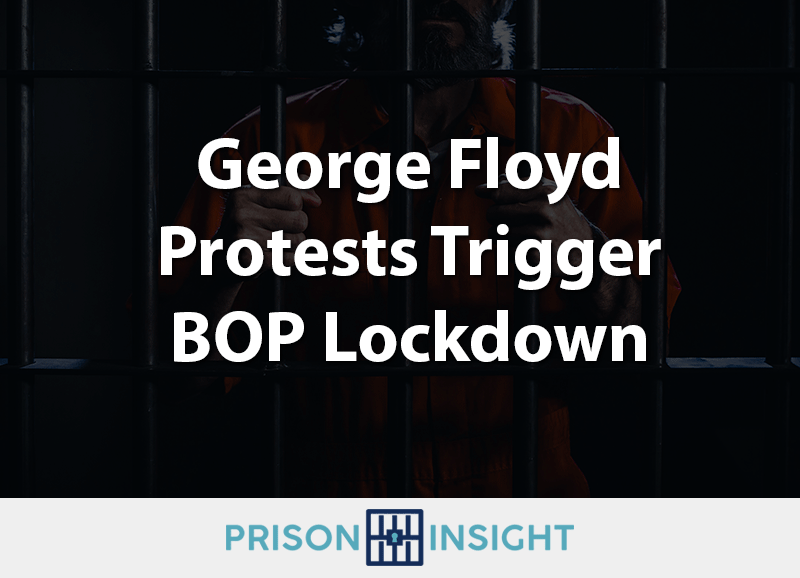After the arrest of George Floyd led to his death at the knees of an officer in the Minneapolis Police Department, protests have broken out all over the globe. But, as everyone knows, many of these peaceful protests have been hijacked by violent looters, and that has resulted in the Federal Bureau of Prisons (BOP) taking a drastic measure.
This past week, the BOP put all of their 122 facilities nationwide on full lockdown as part of additional security measures put in place amid the protests and riots. According to The Hill, this is the strictest measure that the BOP has implemented in 25 years.
The last BOP lockdown took place in 1995 in response to mass rioting inside numerous facilities that started in Talladega, Alabama before spreading across the country. The BOP made it clear that the current lockdown is a precautionary measure instead of a response to what is happening inside their prisons.
The Official BOP Statement
“In light of extensive protest activity occurring around the country, the BOP — in an abundance of caution — is implementing an additional, temporary security measure to ensure the good order and security of our institutions, as well as ensure the safety of staff and inmates,” the agency said in a statement. “In securing our facilities, our hope is that this security measure is short-lived and that inmates will be restored to limited movement in the very near future.”
The BOP added that they will monitor events carefully “as the situation continues to evolve” and they will adjust operations accordingly. This move comes after weeks of strict detention practices during the COVID-19 pandemic, when facilities were put on partial lockdown.
The novel coronavirus makes the situation worse
As of Monday, June 1, the bureau reported a total of 1,650 inmates at the federal facilities tested positive for the novel coronavirus, along with 171 staff members. There have also been 68 federal inmate deaths due to the pandemic.
At least 34,000 inmates in the United States (BOP, state prisons, jails) have tested positive for the coronavirus and 455 inmates have died.
When the COVID-19 pandemic began, US Attorney General William Barr issued a release order, but only about 3,000 federal inmates were released and placed on home confinement. It’s been an incredibly difficult few months for prison inmates, and being in prison is hard enough without the extra security precautions due to the coronavirus and the protests.
The full lockdown began on Sunday, May 31 and there is no end in sight
The Federal Bureau of Prisons houses approximately 13 percent of prisoners in the United States, with 165,575 inmates and nearly 37,000 employees. The BOP sent out an announcement to all of their employees on Sunday, May 31 to let them know about the lockdown.
“The BOP has implemented a national lockdown as of 4 p.m. due to the ongoing unrest and riots nationwide.” It continued, “We will assume lockdown protocols for everyone’s safety and until it is calm around the nation.”
What happens during a full lockdown?
The possibility of prisoner unrest is high because of the mistreatment many inmates have received during the COVID-19 pandemic. Pair that with the current protests on the streets of American cities, and the BOP felt a total lockdown was the right call.
However, this means that federal inmates do not have access to phones, TVs, or mail, and they are even more cut off from the outside world than normal. When I was in prison, we never had a full lockdown last for more than a couple of hours, but even that was scary. Being able to talk to my family on the phone and receive letters was crucial to my mental health, and not having that would have been extremely difficult.
It is also a possibility that the inmates have no idea what is going on with the protests if there is no television time for inmates provided.
They have also shut down mental health services and recreational activities, which means that the inmates are locked up inside their cells for as much as 23 hours per day, seven days a week. Many inmates were already in solitary confinement due to coronavirus exposure, and now every inmate is forced to lockdown in their own cells.
I have not heard from my friend, who is incarcerated in a Missouri state prison, for more than a week, which doesn’t usually happen. I am waiting to hear from her so I can get the inside scoop about what is going on.
Have you heard from your incarcerated loved one during the Black Lives Matter protests? Let us know in the comments below.
Sources: Protests Triggers Strictest Federal Prison Lockdown in 25 Years https://thehill.com/homenews/news/500697-protests-trigger-strictest-federal-prison-lockdown-in-25-years
